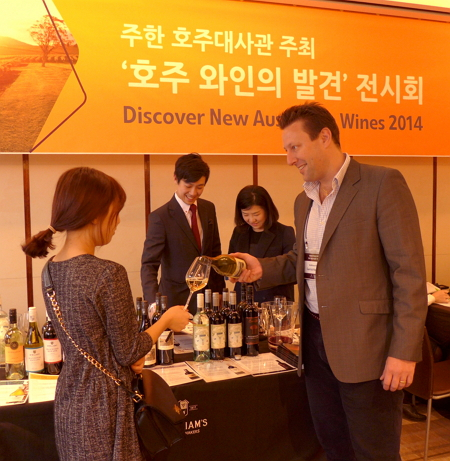Australian wine uncorked for Korean market opening
By Korea HeraldPublished : Nov. 30, 2014 - 21:30
Australia’s scorching sun and mineral-rich soil provide excellent conditions for growing grapes. Australians’ innovativeness, adventurism and love of alcohol has led to the production of some of the finest wines in the world.
In an effort to get more of this wine flowing in Korea, the event “Discover New Australian Wines 2014” was held at Westin Chosun Hotel in Seoul on Nov. 24, introducing 170 premium wines from 21 wineries in Australia to Korean importers, retailers and journalists.
“Today’s Australian winemakers are on the cutting edge of the industry. With over 150 years in perfecting the art and science of winery, our expertise is equivalent to Europe,” Australian Ambassador to Korea Bill Paterson said in a keynote speech at the wine-tasting event. “This showcase will form new connections and present renewed opportunities for long-term partnerships between Australia and Korea.”
Australia has 65 major winemaking regions, making it the world’s sixth-largest producer after France, Chile, Italy, the United States and Spain.
The island continent’s sundry terroir, including the Riverina, Tumbarumba, Hilltops and Orange regions, produces a full spectrum of flavors that range from full-bodied to light. The mineral content in the water holds its tannin structure, which preserves the taste as it ages in the barrels.
“Wine is not just a red liquid. It is the blood of the terra rossa, the sweat of the winemaker that toils the land,” said Viviana Ferrari, a Melbourne-based wine-producer who is also a concert pianist, musicologist and historian. “Wine speaks of the land we love so much. Producing wine makes one contemplate about the good life.”
In an effort to get more of this wine flowing in Korea, the event “Discover New Australian Wines 2014” was held at Westin Chosun Hotel in Seoul on Nov. 24, introducing 170 premium wines from 21 wineries in Australia to Korean importers, retailers and journalists.
“Today’s Australian winemakers are on the cutting edge of the industry. With over 150 years in perfecting the art and science of winery, our expertise is equivalent to Europe,” Australian Ambassador to Korea Bill Paterson said in a keynote speech at the wine-tasting event. “This showcase will form new connections and present renewed opportunities for long-term partnerships between Australia and Korea.”
Australia has 65 major winemaking regions, making it the world’s sixth-largest producer after France, Chile, Italy, the United States and Spain.
The island continent’s sundry terroir, including the Riverina, Tumbarumba, Hilltops and Orange regions, produces a full spectrum of flavors that range from full-bodied to light. The mineral content in the water holds its tannin structure, which preserves the taste as it ages in the barrels.
“Wine is not just a red liquid. It is the blood of the terra rossa, the sweat of the winemaker that toils the land,” said Viviana Ferrari, a Melbourne-based wine-producer who is also a concert pianist, musicologist and historian. “Wine speaks of the land we love so much. Producing wine makes one contemplate about the good life.”

Ferrari, who spent years both in Europe and Australia, said that the two continents have different approaches to their viticulture: “Europeans drink wine for its history. People down under are more down-to-earth about it.”
Due to temperatures that reach above 45 degrees Celsius during midday in Australia, Aussies don’t romance about handpicking grapes in centuries-old orchards as much as their European counterparts, Ferrari said. “However, one can still find traces of the European heritage in Australia’s Little Italy, Little France and Little Germany,” she added.
Ferrari’s brand of Ulupna wine comes from the Goulburn Valley in southeastern Australia. Ulupna produces “single vineyard wine,” made with grapes straight from the company-owned vineyard. Depending on the earthly elements they grow from, the grapes can give birth to a range of colors and flavors: Shiraz, chardonnay, Semillon, pinot noir, cabernet sauvignon and cabernet merlot.
“Winemakers are glorified farmers. It all starts in the vineyards,” McWilliams family winemakers’ general manager Garrick Harvison said. “Despite the new technologies in crop management, mechanical harvest and laboratory analysis, the process has been essentially the same for thousands of years.”
As a general rule, Harvison said, the wine’s taste is enriched and refined as it matures inside the barrel. McWilliams’ flagship wines are left in their casks for between 18 and 24 months, and once bottled, are aged for up to 50 years.
Harvison said that, as citizens of a wine-producing country, Australians have a “high tolerance for wine.” Although the legal drinking age is 18, most people grow up drinking wine at the dinner table or at barbecues in the park, he said.
As people move from punch-drunk evenings to tipsy fine-dining in Korea, Harvison said, Korean connoisseurs will side with the healthier option of wine, which is thought to lower cholesterol and break down fat.
Theresa Kim from the Australian Trade Commission said that Australian wine will become popular again in Korea as the two countries recently signed a free trade agreement. The elimination of a 15 percent tariff will make Australian wine more competitive, and it will keep flowing into the unsaturated market in Korea, Kim said.
According to Kim, “Wine goes hand in hand with food. More so than the delicate European wines, fruity Australian wine is a good match for the peppery and pungent Korean dishes.”
“Winemakers in Australia have continually innovated their practice to create new products. I’m sure Koreans will enjoy the sparkling Shiraz, which goes well with eating a turkey during Australia’s summertime Christmas,” she added.
By Joel Lee (joel@heraldcorp.com)
-
Articles by Korea Herald








![[Graphic News] More Koreans say they plan long-distance trips this year](http://res.heraldm.com/phpwas/restmb_idxmake.php?idx=644&simg=/content/image/2024/04/17/20240417050828_0.gif&u=)
![[KH Explains] Hyundai's full hybrid edge to pay off amid slow transition to pure EVs](http://res.heraldm.com/phpwas/restmb_idxmake.php?idx=644&simg=/content/image/2024/04/18/20240418050645_0.jpg&u=20240419100350)






![[From the Scene] Monks, Buddhists hail return of remains of Buddhas](http://res.heraldm.com/phpwas/restmb_idxmake.php?idx=652&simg=/content/image/2024/04/19/20240419050617_0.jpg&u=20240419175937)

![[KH Explains] Hyundai's full hybrid edge to pay off amid slow transition to pure EVs](http://res.heraldm.com/phpwas/restmb_idxmake.php?idx=652&simg=/content/image/2024/04/18/20240418050645_0.jpg&u=20240419100350)

![[Today’s K-pop] Illit drops debut single remix](http://res.heraldm.com/phpwas/restmb_idxmake.php?idx=642&simg=/content/image/2024/04/19/20240419050612_0.jpg&u=)